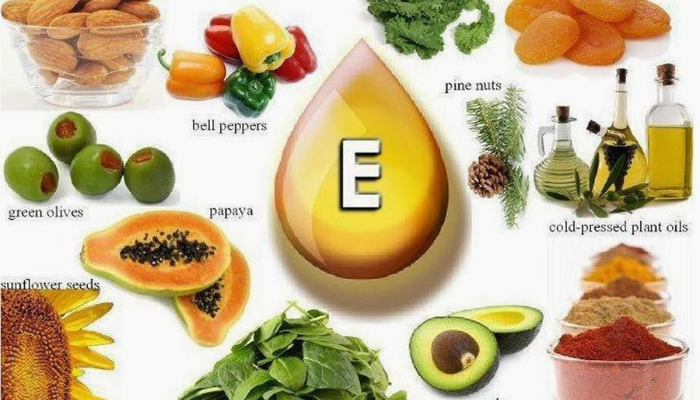Vitamin E is a powerful antioxidant that protects the body from free radical damage. It is a fat-soluble vitamin in many foods, including nuts, seeds, leafy greens, and vegetable oils. Vitamin E is essential for healthy skin, eyes, and immune systems. It also helps protect against heart disease, cancer, and other chronic illnesses. Vitamin E has been studied extensively for its potential to reduce inflammation, improve cognitive function, and even slow aging.
What is Vitamin E?
Vitamin E is an essential nutrient that is fat-soluble and found in various foods. It is a powerful antioxidant that helps protect cells from damage and has numerous health benefits. It is also known as tocopherol and is available in several forms, including alpha, beta, delta, and gamma-tocopherol. Vitamin E is essential for proper cell function and helps protect cells from damage caused by free radicals. It also helps maintain healthy skin, eyes and even aids in wound healing.
Vitamin E also helps keep cholesterol levels in check, prevents heart disease, and helps protect the body from oxidative damage. Vitamin E can be found in various foods, including vegetable oils, nuts, seeds, spinach, wheat germ, and fortified cereals. It is also available as a dietary supplement in capsule, softgel, and liquid forms.
Health Benefits of Vitamin E
Vitamin E is an essential micronutrient that plays a vital role in many bodily functions. It has antioxidant properties that help protect cells from damage and is necessary for maintaining healthy skin, hair, and nails. Vitamin E also helps to reduce inflammation, regulate cholesterol levels, and support eye health. It is found naturally in many foods, including nuts, seeds, leafy green vegetables, and vegetable oils.
Additionally, it is available in supplement form. The health benefits of vitamin E include:
Supporting immune system health.
Reducing the risk of heart disease.
Helping to reduce the effects of aging.
It can also help reduce the risk of cancer, Alzheimer’s disease, and diabetes.
Vitamin E is also known to have anti-inflammatory properties, which can help reduce the severity of conditions such as asthma. Additionally, it helps to prevent blood clotting and may reduce the risk of stroke. Furthermore, it is beneficial for skin health, as it helps to reduce the signs of aging and can prevent or minimize scarring. Vitamin E can help reduce oxidative stress and protect against free radical damage by providing a potent antioxidant boost.
Vitamin E Deficiency
Vitamin E deficiency is rare when the body does not get enough of this essential nutrient. It can cause serious health problems, including anemia, nerve damage, and vision problems.
A lack of vitamin E also increases the risk of heart disease, stroke, and cancer. Fortunately, vitamin E deficiency is rare; most people can get enough vitamin E from their diets. Eating foods rich in vitamin E is the best way to ensure you get enough of this vital nutrient.
Some of the best sources of vitamin E include vegetable oils, nuts, seeds, green leafy vegetables, and fortified cereals. Eating a balanced diet with these foods can help prevent vitamin E deficiency and its associated health risks.
Sources of Vitamin E
Vitamin E is an essential nutrient for the human body. It is a fat-soluble vitamin that is found in a variety of foods. It is an antioxidant that helps protect cells from damage caused by free radicals. Vitamin E is also a great energy source, as it helps the body convert food into energy. Sources of Vitamin E include nuts, seeds, vegetable oils, wheat germ, and green leafy vegetables. Nuts and seeds are exceptionally high in Vitamin E, as are vegetable oils such as canola, sunflower, and olive oil. Wheat germ is also a good source of Vitamin E, as it contains a high amount of the vitamin. Green leafy vegetables, such as spinach and kale, are also a great source of Vitamin E. Other sources of Vitamin E include eggs, egg yolks, and liver. Vitamin E is also found in some multivitamins and dietary supplements.
In addition to providing essential nutrition, Vitamin E has many health benefits. It helps to improve vision, reduce inflammation, and reduce the risk of some chronic diseases. Vitamin E is also known to help protect the skin from sun damage and reduce wrinkles. Vitamin E can also help to reduce the risk of heart disease and stroke. The antioxidant properties of Vitamin E can also help to protect the body from free radical damage.
Getting enough Vitamin E is essential for overall health. Eating various foods that are Vitamin E sources can help ensure you are getting enough of this crucial nutrient.
Recommended Dietary Allowance For Vitamin E
The Recommended Dietary Allowance (RDA) for Vitamin E is 15 mg/day for adults. Vitamin E is an essential nutrient that helps maintain healthy skin and tissues, protects cells from damage, and helps boost the immune system. It also plays a role in neurological health, protecting the cells of the nervous system from oxidative damage.
Vitamin E can be found in various foods, such as nuts, seeds, vegetable oils, and green leafy vegetables. Vitamin E is a fat-soluble vitamin, meaning it is stored in the body’s fatty tissues and can be readily used when needed. Studies have shown that Vitamin E is vital for preventing and managing many chronic diseases, including heart disease, diabetes, and cancer. Vitamin E also helps keep bones strong and aids in wound healing.
In addition to its many health benefits, Vitamin E is an essential nutrient for healthy skin and hair, helping keep them youthful and vibrant.
Potential Side Effects of Vitamin E
Vitamin E is considered beneficial for human health, but there are potential side effects. Vitamin E is a fat-soluble vitamin that has antioxidant properties. It is found in many foods, including nuts, seeds, and vegetable oils.
While Vitamin E is beneficial for promoting cardiovascular health, boosting immunity, and protecting against certain types of cancer, it can also lead to some adverse side effects. Overdosing on Vitamin E can lead to an increased risk of bleeding and bleeding-related conditions, as well as nausea, dizziness, and headaches.
Additionally, there is a potential for interactions with certain medications, including blood thinners, statins, and anticoagulants. Therefore, speaking to a healthcare professional before taking supplements or drastically increasing your dietary Vitamin E intake is crucial.
Conclusion
Vitamin E health benefits are plentiful. It is an essential nutrient for a healthy body and vital in many processes. Vitamin E is a powerful antioxidant, and it helps to protect our cells from damage and prevent diseases like cancer. It can also help to reduce inflammation and improve the immune system. Additionally, Vitamin E is an excellent source of nutrients like magnesium, zinc, and selenium. It also helps to regulate blood sugar levels and provide energy. Vitamin E can be found in many foods, including nuts, seeds, and leafy green vegetables. It is also available in supplements, though it is best to consult a doctor before taking any supplement. Vitamin E in the recommended amounts helps keep the body healthy and functioning optimally.


















Comments